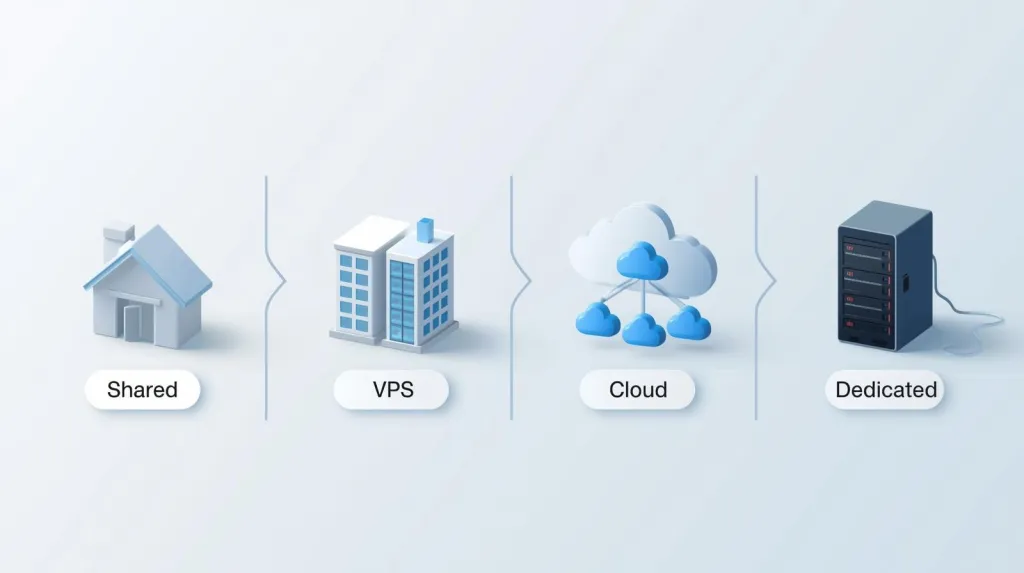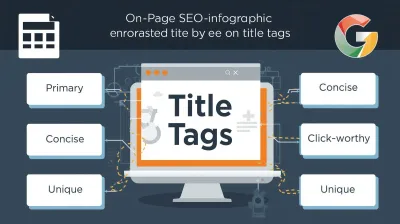Selecting the right web hosting is one of the most crucial decisions when starting a website. It's the foundation your site is built upon, affecting its speed, reliability, and security. But with so many options – Shared, VPS, Cloud, Dedicated – how do you choose? This beginner's guide breaks down the main types of web hosting to help you make an informed decision.
What is Web Hosting?
Think of web hosting as renting space on a specialized computer (a server) where your website's files (code, images, text, databases) are stored. When someone types your domain name into their browser, the browser connects to this server, retrieves the files, and displays your website. The hosting provider manages the server hardware, network connection, and necessary software.
1. Shared Hosting
Analogy:** Like living in an apartment building.
Shared hosting is the most popular and affordable option, especially for beginners. Your website shares server resources (CPU, RAM, disk space) with hundreds or even thousands of other websites on the same physical server.
Pros:
- Most Affordable:** Lowest cost option, great for starting out.
Easy to Manage:** Hosting provider handles server maintenance, updates, and security patches. Control panels like cPanel or hPanel make management simple.Beginner-Friendly:** No technical server knowledge required.
Cons:
- Limited Resources:** Performance can be affected by other websites on the same server (the "noisy neighbor" effect). If another site gets a huge traffic spike, yours might slow down.
Less Control:** You have limited ability to customize server settings or install specific software.Potential Security Risks:** While providers implement security, a vulnerability on one site *could* potentially affect others on the same server (though good hosts isolate accounts well).
Best For:** Beginners, personal blogs, small business websites, sites with low to moderate traffic.
(Consider adding an affiliate link here: Example: Hostinger offers excellent and affordable shared hosting plans.)
2. VPS (Virtual Private Server) Hosting
Analogy:** Like owning a condo within a larger building.
VPS hosting still involves sharing a physical server, but it uses virtualization technology to create separate, dedicated virtual machines for each user. You get a guaranteed allocation of server resources (RAM, CPU cores) that aren't shared with others.
Pros:
- Guaranteed Resources:** More stable performance compared to shared hosting, less affected by neighbors.
More Control:** You often get root access, allowing you to install custom software and configure server settings.Scalability:** Easier to upgrade resources (RAM, CPU) as your site grows compared to shared hosting.Better Security (Potentially):** Isolation provides better security than shared hosting if configured correctly.
Cons:
- More Expensive:** Costs more than shared hosting.
Requires Technical Knowledge:** You are responsible for managing your virtual server, including software updates, security patches (unless you opt for Managed VPS, which costs more).Steeper Learning Curve:** Not as beginner-friendly as shared hosting unless managed.
Best For:** Websites outgrowing shared hosting, developers needing specific server configurations, businesses needing more stable performance, sites with moderate traffic.
(Consider adding an affiliate link here: Example: Check out Hostinger's VPS plans for more power.)
3. Cloud Hosting
Analogy:** Like using a network of interconnected resources that scale on demand.
Cloud hosting utilizes a cluster of servers working together. Your website's resources are spread across multiple machines. If one server fails, others take over seamlessly. It's known for its scalability and reliability.
Pros:
- High Scalability:** Easily scale resources up or down based on traffic needs, often paying only for what you use.
Excellent Reliability & Uptime:** Redundancy across multiple servers minimizes downtime.Flexible Pricing:** Often pay-as-you-go or resource-based pricing models.Good Performance:** Resources can be allocated efficiently to handle traffic spikes.
Cons:
- Can Be Complex:** Management interfaces and pricing models can be more complex than traditional hosting.
Potentially Variable Costs:** Pay-as-you-go can be unpredictable if traffic spikes unexpectedly (though many offer fixed resource plans too).Technical Knowledge May Be Needed:** Depending on the provider and plan (managed vs. unmanaged).
Best For:** Growing websites, applications requiring high availability, businesses expecting traffic fluctuations, e-commerce sites.
(Consider adding an affiliate link here: Example: Hostinger's Cloud Hosting offers great scalability.)
4. Dedicated Server Hosting
Analogy:** Like owning your own house.
With dedicated hosting, you rent an entire physical server exclusively for your website(s). You have complete control over the hardware, operating system, and all software installations.
Pros:
- Maximum Performance:** All server resources are dedicated to your site.
Full Control & Customization:** Complete root access to configure the server exactly as needed.Highest Security:** You control all security aspects (if managed properly).
Cons:
- Most Expensive:** Significantly higher cost than other options.
Requires Advanced Technical Skills:** You are responsible for all server management, maintenance, security, and troubleshooting (unless you pay extra for management).Overkill for Most:** Unnecessary for the vast majority of websites.
Best For:** Very high-traffic websites, large e-commerce stores, applications with specific or demanding resource needs, businesses requiring maximum control and security.
Which Hosting is Right for You?
Here's a quick summary:
- Starting out? Blog or small site? Choose **Shared Hosting**.
- Need more stable performance or specific software? Site growing? Consider **VPS Hosting**.
- Need high uptime and scalability for fluctuating traffic? Look into **Cloud Hosting**.
- Need maximum power and control for a very high-traffic site? **Dedicated Server** (but only if you have the technical expertise or budget for management).
Choosing the right web hosting is about balancing cost, performance, control, and technical requirements. Start with what you need now, but choose a provider that allows you to easily upgrade as your website grows. Research specific providers, read reviews, and understand the resources included in each plan before making your final decision.






